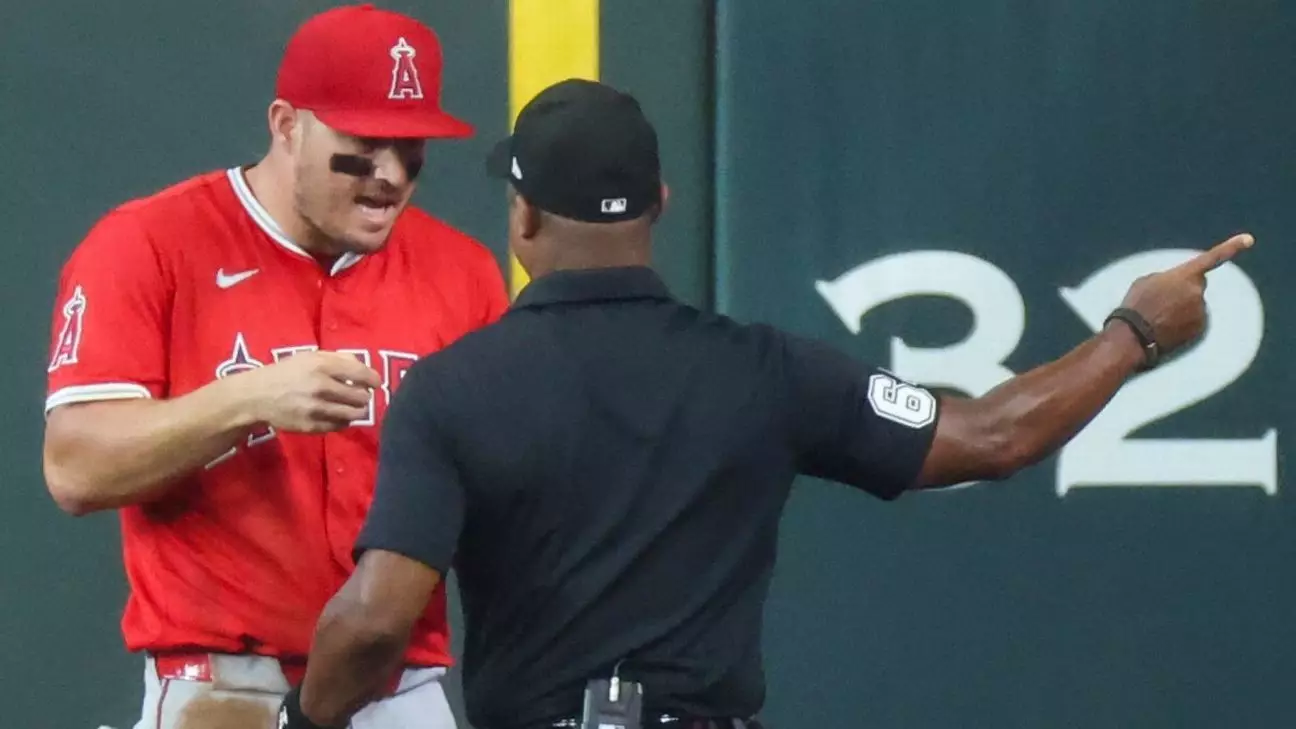Baseball is often hailed as America’s pastime, a game that embodies unpredictability, where each swing of the bat can alter the course of a match. However, on an eventful night in Houston, the unpredictability transcended the diamond and intersected with the stands, reminding fans and players alike of the unique interaction between them. During a recent game, Los Angeles Angels star Mike Trout found himself in a surreal situation where a crucial catch morphed into an unexpected lesson about the sport’s nuances.
The remarkable play occurred when Trout dashed towards the right-field stands to snag a fly ball off the bat of Houston’s Yainer Diaz. The Angels were en route to a 4-1 victory that night, but what should have been a highlight-worthy moment turned into a spectacle as a fan, Jared Whalen, simultaneously reached for the ball. Their energies collided, prompting a split-second decision that would define the evening for both the beloved athlete and the eager fan.
The Fan’s Perspective
Whalen’s perspective sheds light on a scenario where sheer instinct trumped comprehension. According to him, he was oblivious to the fact that what he was witnessing was a live play; instead, instinct kicked in, compelling him to protect his son seated nearby. “It was coming at my son’s face. I just reached out,” he explained later to The Athletic. This reaction highlights the natural, albeit chaotic, impulses that can send an entire stadium into a frenzy. Many spectators might find themselves torn between reverence for the game and the instinct to protect loved ones, and Whalen’s situation perfectly encapsulates that dichotomy.
However, this encounter also raised questions about the boundaries of fair play. Some fans expressed sympathy toward Trout, lamenting that an unintentional act by a spectator resulted in a moment of frustration for one of baseball’s most celebrated figures. This blend of camaraderie and rivalry often defines the atmosphere in the stands—where fans cheer for their teams even as they share humanity with the players they idolize.
Trout’s Response
One cannot help but admire Trout’s sportsmanship in the face of this unusual scenario. Instead of berating the fan for interference, Trout demonstrated his empathetic side, acknowledging the innocent mistake and espousing a valuable lesson learned through experience. His comments, “He was really apologetic. I learn new things every single day,” exemplify an athlete who appreciates that the game encompasses more than mere statistics and records—it is about connection, humanity, and understanding that mistakes happen.
Trout’s transition from center to right field this season aimed to reduce wear on his body, allowing him to remain a cornerstone of the Angels lineup. Yet, even amid this strategic change, he remains acutely aware of the uncharted territories that come with playing in high-energy environments. His graceful handling of the situation broke through the competitive facade of the sport, humanizing a star athlete and reminding fans that even titans of the game face unique challenges.
The Umpires and Unexpected Outcomes
In the aftermath of the incident, the umpires grappled with a judgment call under contentious circumstances. First base umpire Alan Porter ruled the ball a foul, thus making it a dead ball rather than a catch. Despite the option for Angels manager Ron Washington to challenge the call, he opted not to risk losing a valuable opportunity later in the game. This decision sparked conversation among fans about the complexities of game rules and the sheer unpredictability of on-field decisions that can alter outcomes, leading to playful debates among fans regarding the objectivity of umpires in such ambiguous situations.
Porter later clarified to reporters that once the ball is deemed to be outside the field of play, the fielder enters the stands at their peril. This statement touches upon a larger dialogue in sports about player safety and spectator engagement. The game thrives on fan interactions, yet it also begs the question: where do we draw lines in moments of enthusiasm?
A Moment to Remember
In the end, the situation wrapped itself up neatly, embodying the spirit of camaraderie that often characterizes baseball. After the game, Trout took it upon himself to meet Whalen and his son, gifting them both a signed baseball and a bat, initiating a moment of connection that will surely be cherished long after the season fades. In that fleeting encounter, he transformed what could have been a moment of tension into a heartwarming tale, showcasing the impact of simplicity in sports.
While the scoreboard aged with time, the memory of an unexpected catch evolved into an unforgettable experience, proving that sports are about much more than just numbers and wins. They are about the connections forged in the hallways of stadiums and the lasting impressions exchanged between players and fans. As the Angels left Houston, the night echoed with laughter, goodwill, and the reminder that the game thrives on shared human experiences, making every play, every catch, and even every unintentional act something worth watching.

